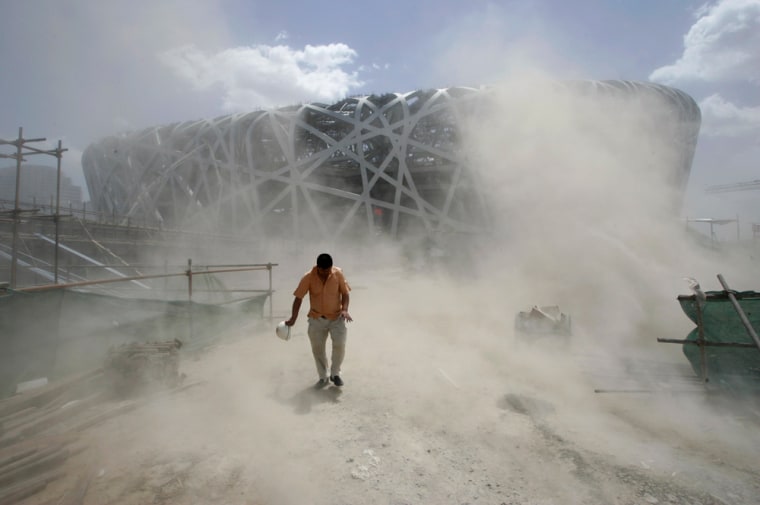The countdown is on. Exactly one year from today, the Olympic Games begin in Beijing —bringing a major building boom throughout China.
You can't miss the signs. Construction cranes are looming everywhere, and construction is going at a breakneck pace. But it's not only the city of Beijing in the midst of a pre-Olympic building boom. Businesses are also busy gearing up — hoping to see the payoff after the Olympic torch is lit, and long after it's extinguished.
One major project, the newest Ritz-Carlton and J.W. Marriott hotels, got under way just a year after Beijing was named host of the summer Olympics in 2000. Marriott, like scores of companies here, is betting that the Olympics will bring new customers who will remain customers long after the games have gone.
“The timing of an Olympic event combined with the economic growth that occurs in China right now, I think it's quite a unique combination,” said Robert Lohrmann, a managing director at Marriott. “And one that maybe hasn't existed in other Olympic cities in the past few Olympics.”
The two hotels in this project are scheduled to open by the end of this year. And Marriott's got three other properties under construction right now. That means by the time the Olympic games begins, Marriott alone will have added 2,800 new rooms to the Beijing market.
To feed the crowds, McDonald's is also building, adding to its 811 restaurants in China, four more in Beijing alone, two in the Olympic village for athletes and media and two retail outlets. It is also busy recruiting 1,200 new employees for all its locations across the country.
“Even without, for example, the Olympics coming into China we're committed to building 100 new restaurants a year for the foreseeable future,” said Gary Rosen, head of marketing for McDonald's in China.
To celebrate the year countdown, McDonald's has invented a new Sichuan spice-inspired menu item, the China-Mac.
With the entire city gearing up — building new malls, roads and subways — Caterpillar has seen strong demand for its construction equipment, like its made-in-China hydraulic excavator, which is being used to build the Aquacube, the official Olympic swimming venue.
It’s all part of Caterpillar's long-term, post-Olympic China strategy to triple sales by 2010.
“Anywhere else you travel in China you can see highways are being built,” said Jim Dugan, a spokesman for Caterpillar in China. “There is a tremendous amount of mining activity that is going on. While the Beijing Olympics gets a lot of attention, and it clearly is a very important event, there are lots of other things going on around the rest of China.”
Others also predict China's rapid growth will offset any post-Olympic slowdown.
“There is more and more money being made in China,” said Lohrmann. “We expect that the growth will continue. Otherwise we wouldn't be developing at such a rapid pace.”
Gearing up for the Olympic games, and long after they're gone, the race is on for China's 1.3 billion potential customers.
After the Olympics, many companies say another event may provide a business boost — the World Expo in Shanghai in 2010. But most are betting that China's 11 percent GDP growth alone should be enough to sustain their expansion plans.
